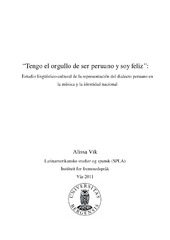| dc.description.abstract | The main objective of this thesis was to find out whether or not the Peruvian dialect is a part of the Peruvian national identity, using music as a medium. To accomplish this objective, interviews were conducted in Trujillo, Peru. The purpose of these interviews was primarily to create a corpus or body of Peruvian music that represents the national identity of those interviewed, and secondarily to determine if Peruvians are conscious of their own dialect. Once the names of songs representing Peruvian nation identity were collected, the degree to which they reflect the phonetic, morphological, syntactical, and lexical features of the Peruvian dialect(s) was analyzed. This linguistic analysis was then used to determine to what extent the Peruvian dialect forms a part of their national identity; that is, if the corpus reflects in a high degree the Peruvian dialect, then this dialect would appear to be one of the values that makes up their national identity, and vice versa: if the corpus does not reflect the Peruvian dialect to a great extent, then their dialect would appear not to be a strong part of their national identity. In addition to the analysis of linguistic elements in the songs, extra-linguistic elements such as cultural references that do not form a part of the Peruvian lexicon, themes, musical genres, and, to a limited degree, instrumentation and melody were observed. These extra-linguistic features were then compared with the linguistic features in the songs, to determine which type of element was more common. The responses of the Peruvians interviewed were also analyzed to find out if they are conscious of their own dialect and whether or not it forms a part of their national identity, that is, the interviews were analyzed from a meta-linguistic angle. The linguistic, extra-linguistic, and meta-linguistic elements were also studied using the sociolinguistic factors of gender, age, and level of education. | en_US |
| dc.description.abstract | El objetivo principal de esta tesina fue averiguar si el dialecto peruano forma parte de la identidad nacional a través de la música. Se hicieron entrevistas en Trujillo, Perú para crear un corpus de música peruana que representa la identidad nacional de los entrevistados. Después de identificar las canciones que representan el sentimiento nacional de los peruanos, se buscaron peruanismos fonéticos, morfosintácticos y léxicos para ver en qué grado el corpus refleja los rasgos del español peruano. Además de elementos lingüísticos, se observaron elementos extralingüísticos en las canciones, como referencias culturales no lingüísticas, temas, géneros musicales y, en cierta medida, instrumentos y melodía. Se comparó la cantidad de elementos lingüísticos con la cantidad de elementos extralingüísticos para ver qué tipo de elemento fue más común y, por lo tanto, más importante en la formación de la identidad nacional peruana. También se hizo un análisis metalingüístico de las entrevistas para ver si el dialecto peruano forma parte de la identidad nacional y si los peruanos son conscientes de su propio dialecto. Después del análisis lingüístico, extralingüístico y metalingüístico, los elementos encontrados fueron analizados sociolingüísticamente, usando factores de sexo, edad y nivel de educación. | en_US |
